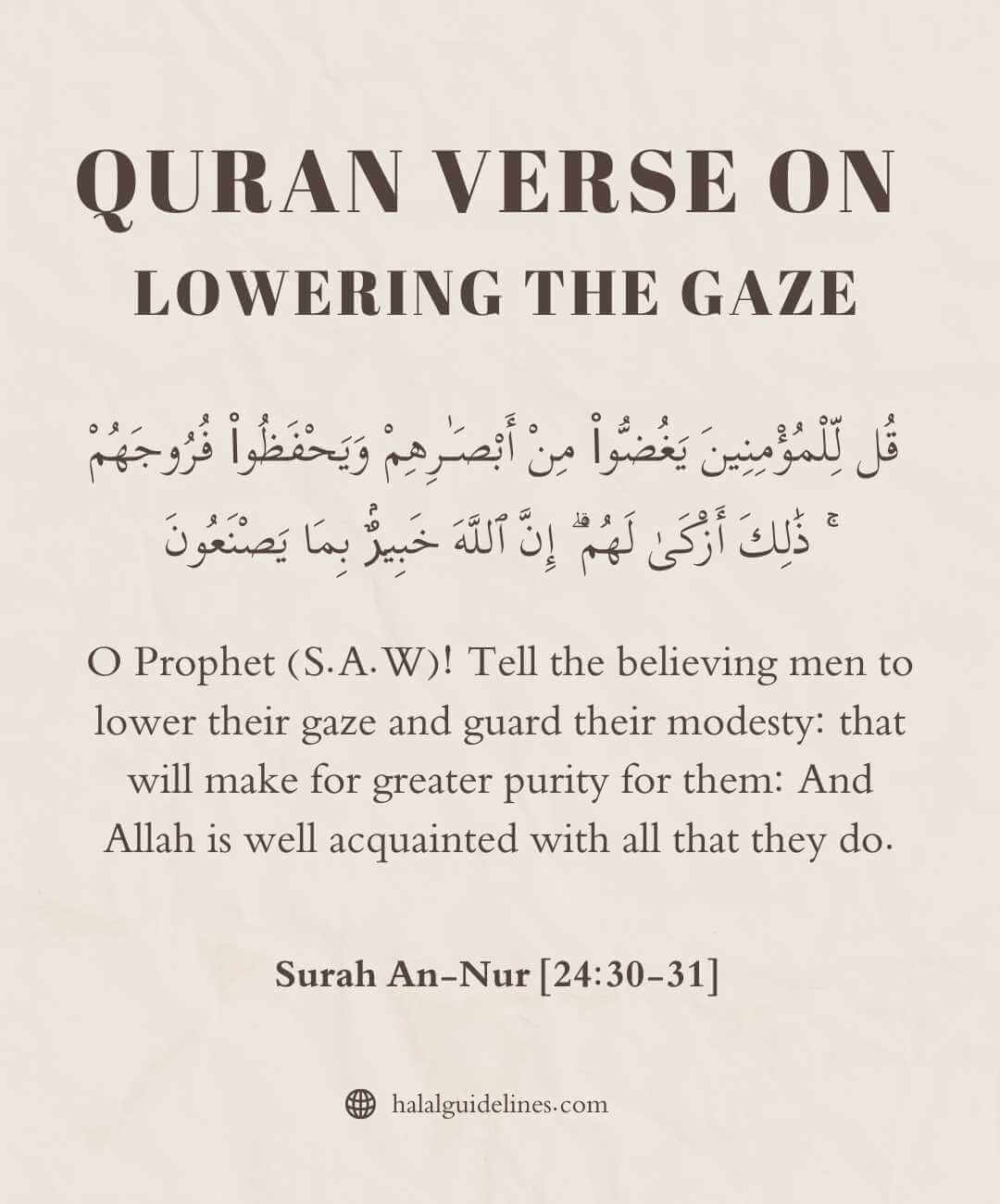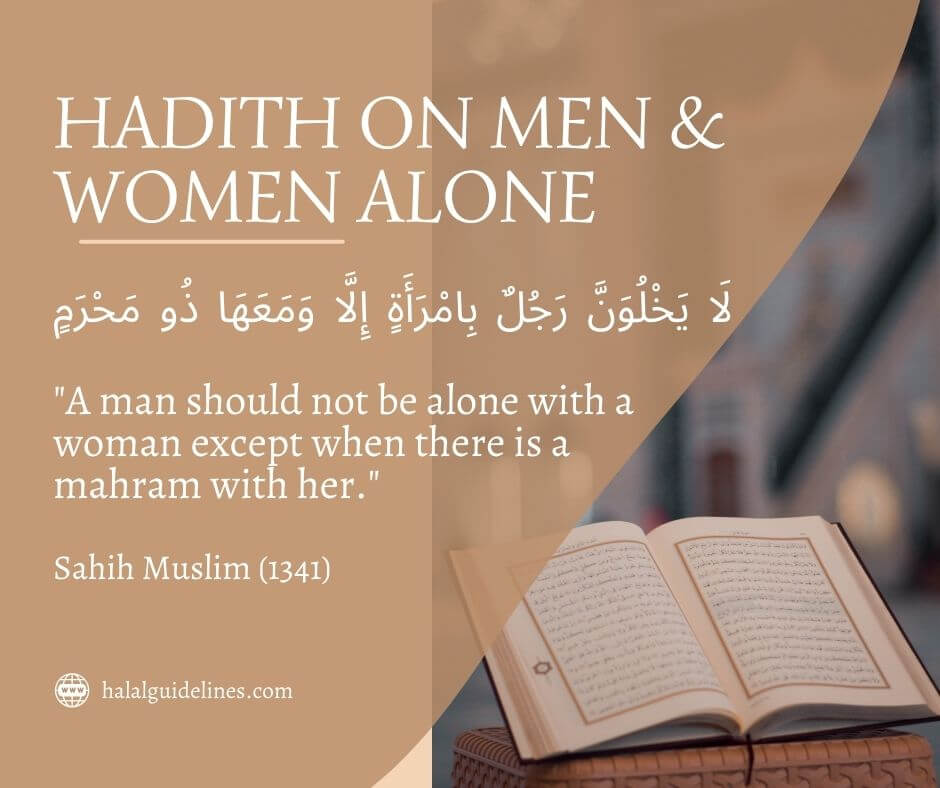It is best to talk in public places and keep things brief and to the point. The main idea is to be modest and avoid situations that might lead us to temptation or wrongdoing.
Is Touching a Non-Mahram Haram and Who Are You Allowed to Touch?

In Islamic teachings, touching a non-mahram (someone of the opposite gender who is not closely related) is considered haram. This includes common gestures like shaking hands, hugs, or casual physical contact potentially lead to inappropriate feelings or actions. Even innocent touches, like a pat on the back, are discouraged to maintain clear boundaries.
The goal is to prevent situations that might lead to temptation or inappropriate behavior encouraged by Shaitan. But, exceptions may be made in cases of emergencies or medical necessity if no person of the same gender is available.
Halal or Haram Status of Touching the Opposite Gender
Islam has clear guidelines regarding who you are allowed to touch based on your relationship with the opposite gender. Physical contact, such as hugs or handshakes, is permissible only with specific family members (mahram) or those you are closely related to.
Below is the table you can look at who you are allowed to touch according to Islamic teachings:
| Relationship | Status for Both Males and Females |
|---|---|
| Spouse | ✅ Halal (Allowed) |
| Parents | ✅ Halal (Allowed) |
| Cousins | ❌ Haram (Not Allowed) |
| Siblings | ✅ Halal (Allowed) |
| In-laws | ✅ Halal (But only Father and Mother in law) |
| Grandparents | ✅ Halal (Allowed) |
| Strangers | ❌ Haram (Not Allowed) |
| Friends | ❌ Haram (Not Allowed) |
| Aunts/Uncles | ✅ Halal (Allowed) |
| Children | ✅ Halal (Allowed) |
| Teachers | ❌ Haram (Not Allowed) |
| Gym Instructors | ❌ Haram (Not Allowed) |
| Colleagues | ❌ Haram (Not Allowed) |
| Neighbors | ❌ Haram (Not Allowed) |
As a Muslim, it is important to know who you can touch and who you should avoid in Islam. The table above clearly shows that while you can feel certain family members, you should avoid touching the opposite gender. You can hug and touch people of the same gender without any problems. Always be mindful of these guidelines to create a positive and respectful environment.
Read More Article Related:
Why Islam Prioritizes Mahram and Non-Mahram Boundaries
Islam places great importance on mahram and non-mahram relationships to protect our society and keep our interactions pure. These principles help us maintain modesty, respect, and clear boundaries between genders.
Quran Verse on Lowering the Gaze (Look)
Islam gives us clear instructions regarding who is considered a mahram and who is not. This distinction is important to follow so that we maintain the boundaries set by Allah.
In Surah An-Nur [24:30-31] Allah reminds us that:
قُل لِّلْمُؤْمِنِينَ يَغُضُّوا۟ مِنْ أَبْصَـٰرِهِمْ وَيَحْفَظُوا۟ فُرُوجَهُمْ ۚ ذَٰلِكَ أَزْكَىٰ لَهُمْ ۗ إِنَّ ٱللَّهَ خَبِيرٌۢ بِمَا يَصْنَعُونَ
Meaning: O Prophet (S.A.W)! Tell the believing men to lower their gaze and guard their modesty: that will make for greater purity for them: And Allah is well acquainted with all that they do.

This verse teaches us to be mindful of our gaze and behavior. By lowering our gaze and being modest, we protect ourselves from temptation and maintain purity in our hearts and actions. This applies to both men and women, helping us avoid unnecessary attraction or improper thoughts about non-mahrams.
Hadith on the Importance of Mahram Boundaries
The Prophet Muhammad (peace be upon him) also highlights the importance of understanding mahram and non-mahram relations.
There is a famous hadith that says:
لَا يَخْلُوَنَّ رَجُلٌ بِامْرَأَةٍ إِلَّا وَمَعَهَا ذُو مَحْرَمٍ
Translation: “A man should not be alone with a woman except when there is a mahram with her.”
Reference: Sahih Muslim (1341)

In another hadith, Our Prophet Muhammad (peace be upon him) gave us clear instructions about touching non-mahrams:
عَنْ مَعْقِلِ بْنِ يَسَارٍ قَالَ قَالَ رَسُولُ اللَّهِ صَلَّى اللَّهُ عَلَيْهِ وَسَلَّمَ لَأَنْ يُطْعَنَ فِي رَأْسِ أَحَدِكُمْ بِمِخْيَطٍ مِنْ حَدِيدٍ خَيْرٌ لَهُ مِنْ أَنْ يَمَسَّ امْرَأَةً لَا تَحِلُّ لَهُ
Meaning: The Messenger of Allah, peace and blessings be upon him, said, “For one of you to be stabbed in the head with an iron needle is better for him than to touch a woman who is not permissible for him.”
Reference: Al-Mu’jam Al-Kabir 16910

This hadith shows us how seriously we should take the matter of physical contact with non-mahrams. It reminds us that even seemingly small actions can have significant spiritual consequences. By following this principle, we protect ourselves from potential sin and maintain the purity of our interactions.
The concept of mahram and non-mahram in Islam is there to protect us, our families, and society from harm. By following these teachings, we can maintain respect, modesty, and purity in our relationships.
Islamic Scholar Knowledge on Non-Mahram Debate
When it comes to understanding how Muslims should interact with people who aren’t close family members (non-mahrams), Islamic scholars have a lot of important insights to share. Their knowledge helps us handle tricky social situations while staying true to our faith.
Mufti Menk’s Views on this Topic
He explains that interacting with the opposite sex is often unavoidable in daily life, Regardless it is at school, work, or in public spaces. He points out that these interactions should always be respectful and dignified. Mufti Menk reminds us to control our gaze, use polite language, and avoid inappropriate conversations. He stresses that every word we speak is recorded by Allah and will either benefit us or count against us on the Day of Judgment.
Here you can watch his full video below:
Dr. Zakir Naik’s Opinions on Looking at Non-Mahram
He explains the Islamic guidelines for men when interacting with non-mahram (unrelated) women. He mentions that men can look at a woman while speaking to her, but they must lower their gaze once they realize she is a woman. Staring or looking with lust is prohibited in Islam. Dr. Naik clarifies that an accidental first glance is allowed, but any further prolonged look is forbidden.
Watch out his video below:
Sheikh Assim Al-Hakeem’s Feelings About This
He discusses the idea that communicating with the opposite gender, especially on social media, is acceptable as long as the conversations are appropriate. He highlights that this view, known as “free mixing,” is misleading. He also explains that Allah has instructed believers to avoid the footsteps of Shaitan (Satan), which means that minor infractions can lead to major sins.
He warns that such interactions can start innocently but gradually lead to inappropriate thoughts and actions. The key issue is if one chooses to follow Islamic teachings (Sharia) or their own desires.
By listening to these wise scholars, we can better understand how to live as good Muslims in the modern world. Their teachings remind us to be careful, respectful, and pure in our interactions with others, helping us stay on the right path and build a strong, moral community.
Final Thoughts on Mahram and Non-Mahram Relationships
Brothers and sisters, we Muslims should know that following in Prophet Muhammad’s (S.A.W) footsteps is the best way to live our lives. When it comes to mahram and non-mahram matters, his example shows us how to be respectful, modest, and pure in our daily interactions. By sticking to these teachings, we protect ourselves from temptation and create a society built on trust and good behavior.
Remember, that these rules aren’t meant to make life difficult, but to help us grow closer to Allah and each other in the right way. By being mindful of these boundaries, we can strengthen our faith, our families, and our community.







